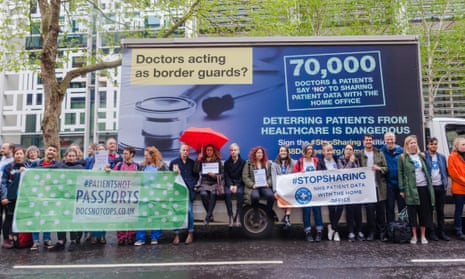NHS Digital, which collects confidential patient information, is sharing this personal data with the Home Office to support its immigration enforcement work. This can result in patients being detained and potentially deported.
In the Doctors of the World (DOTW) UK London clinic, doctors, nurses and support workers provide medical care for people excluded from NHS services – including asylum seekers and undocumented migrants. Here we see the impact of the fear of sharing patient data every day. We see vulnerable people who are simply too scared to approach NHS services, anxious it will lead to a knock on the door from the Home Office.
Many of those turned away from the NHS are survivors of torture, trafficking and other human rights abuses. People in urgent need of access to medical care, including pregnant women and those with cancer, are steering clear of NHS services because they believe their information will be shared with the Home Office.
That’s why DOTW UK, where I am head of the board of trustees, is making a stand along with other doctors, nurses and midwives by spoofing the Home Office’s “Go home” vans to highlight the impact government policies have, not only on patients but also on NHS staff.
As a doctor specialising in prostate cancer, I know patient confidentiality is the cornerstone of the doctor-patient relationship. It allows patients to trust us and confide to us their most private matters. It should be sacrosanct and not undermined by our government. Today’s action follows a petition, signed by 70,000 doctors and patients, calling on the health secretary, Jeremy Hunt, and NHS Digital to stop the practice of sharing our private data, which has been in place since January 2017.
Clinical teams and hospital overseas visitors managers are not trained in immigration law and should not be asked to judge a patient’s entitlement to care. As clinicians, our main focus is to provide care to those that need it, an ethos at the heart of the NHS. Having to think about an individual’s immigration status before giving treatment compromises the relationship between doctors, nurses, midwives and their patients. Being made a part of the Home Office’s “hostile environment” policy is totally objectionable to me and all of the colleagues I have spoken to.
On Monday night Sylvester Marshall, known previously in the media as Albert Thompson, spoke to a packed room in parliament about being refused radiotherapy treatment for prostate cancer unless he paid £54,000 upfront. This distressing story hit me on two levels.
I imagined how stressful it would be to be denied treatment knowing that a prolonged wait for radiotherapy could affect the outcome of treatment. It also struck me how current Home Office policies impact on NHS staff and patients. The NHS charging regulations are clear on one thing: urgent or immediately necessarily care should never be withheld from a patient. Yet Mr Marshall was left waiting for definitive treatment until he paid an unaffordable fee.
How did this happen? The rules governing entitlement to free NHS care are complex and poorly understood by many in the NHS. The 118 pages of guidance from the Department of Health and Social Care include a detailed lists of circumstances and diseases that are exempt from charges. Such complexity makes it difficult for staff to judge if providing care is allowed and overzealous interpretation risks patients being turned away.
I’m delighted that Mr Marshall’s treatment is now under way. All of us at DOTW UK also hope that the attention to the issues raised by his case and today’s protest will lead to reconsideration of the decision by NHS Digital to share patient data with the Home Office – and that denial of access to urgent and necessary care will be eliminated from the NHS immediately.
